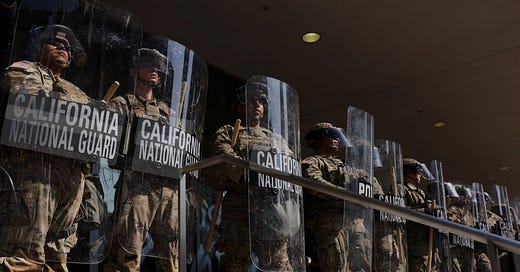Donald Trump, the Vandal in Chief, sends in the military to solve a problem he created
"Law and Order" is a reliable old tactic for authoritarians
We’re living in serious times – a dangerous moment. So here’s the theme that will permeate my work this summer:
The battle is on, but it’s not primarily a battle in the streets. It’s a battle for the hearts and minds of Americans. And the question to be decided is this: Will we embrace a perverted understanding of justice built on authoritarian “law and…
Keep reading with a 7-day free trial
Subscribe to Culture, Faith, and Politics with Pat Kahnke to keep reading this post and get 7 days of free access to the full post archives.




